Premium Safety Helmet with Visor for Construction & Industrial Use
Explore key parameters, trends, and manufacturer comparison for construction and industrial safety helmet with visor solutions.
Product link: ABS Material Engineering Safety Helmets with Worker Visor
The increasing emphasis on workplace safety across construction, petrochemical, metallurgy, and urban infrastructure sectors has significantly boosted the demand for high-performance safety helmet with visor solutions. According to Grand View Research, the global industrial safety helmet market surpassed $1.4 Billion USD in 2023, with visor-fitted helmets constituting ~33% of total sales due to enhanced facial protection requirements.
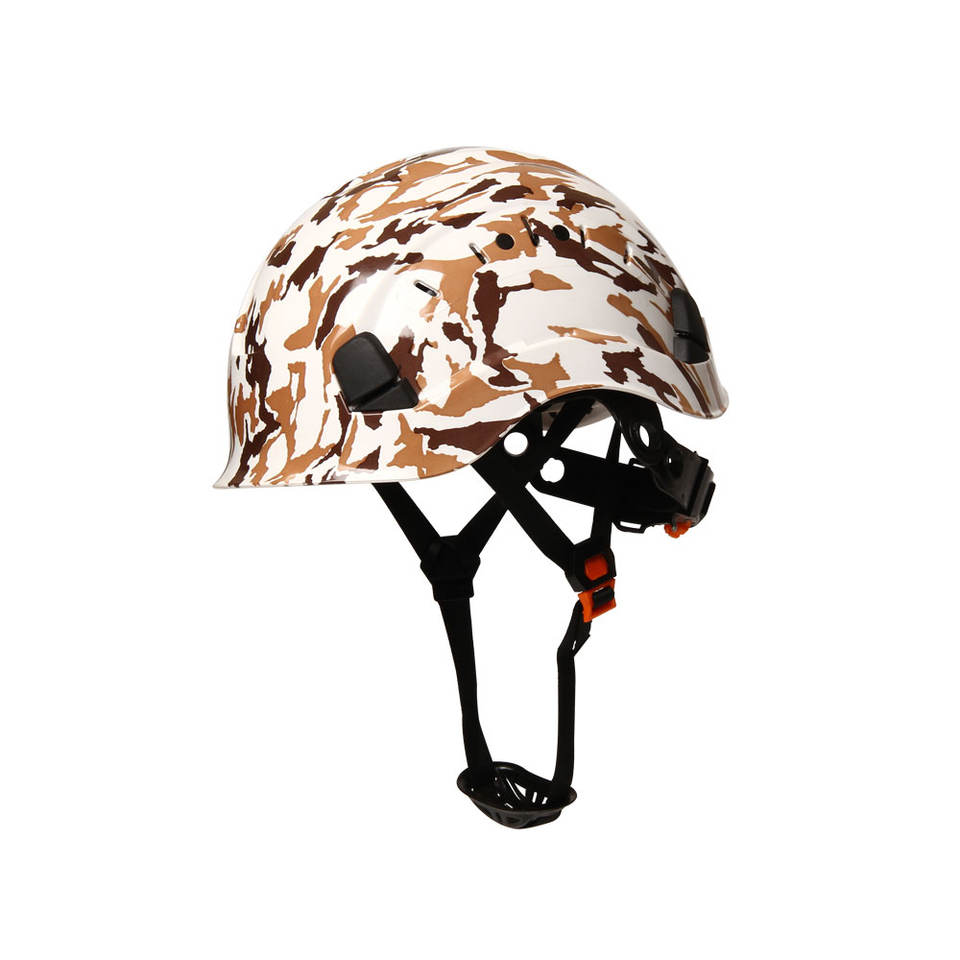
| Model | Main Material | Visor Type | Impact Resistance (J) | Electrical Insulation | Compliance | Weight (g) | Service Life (years) |
|---|---|---|---|---|---|---|---|
| ABS Engineering Helmet [Product Link] | ABS | Adjustable Polycarbonate | 60–90 | Class E (up to 20kV) | EN397 / ANSI Z89.1 | 385–425 | 3–5 |
| Standard Construction Helmet | HDPE | Fixed Acrylic | 30–45 | Class C | GB2811-2019 | 320–350 | 2–3 |
| Industrial Metal Worker Helmet | Fiberglass | Flip-up Glass | 70–120 | Class G (up to 2kV) | ANSI/ISEA Z89.1-2014 | 470–550 | 5–7 |
| Multi-Function Visor Helmet | ABS/Polycarbonate | Retractable PC | 65–95 | Class E | EN50365:2002 | 410–460 | 4–6 |

The ABS Material Engineering Safety Helmets with Worker Visor are produced via a multi-stage advanced process to ensure robust quality, consistent with global standards (ISO 3873, ANSI Z89.1).
* See diagram below for workflow and quality control points.
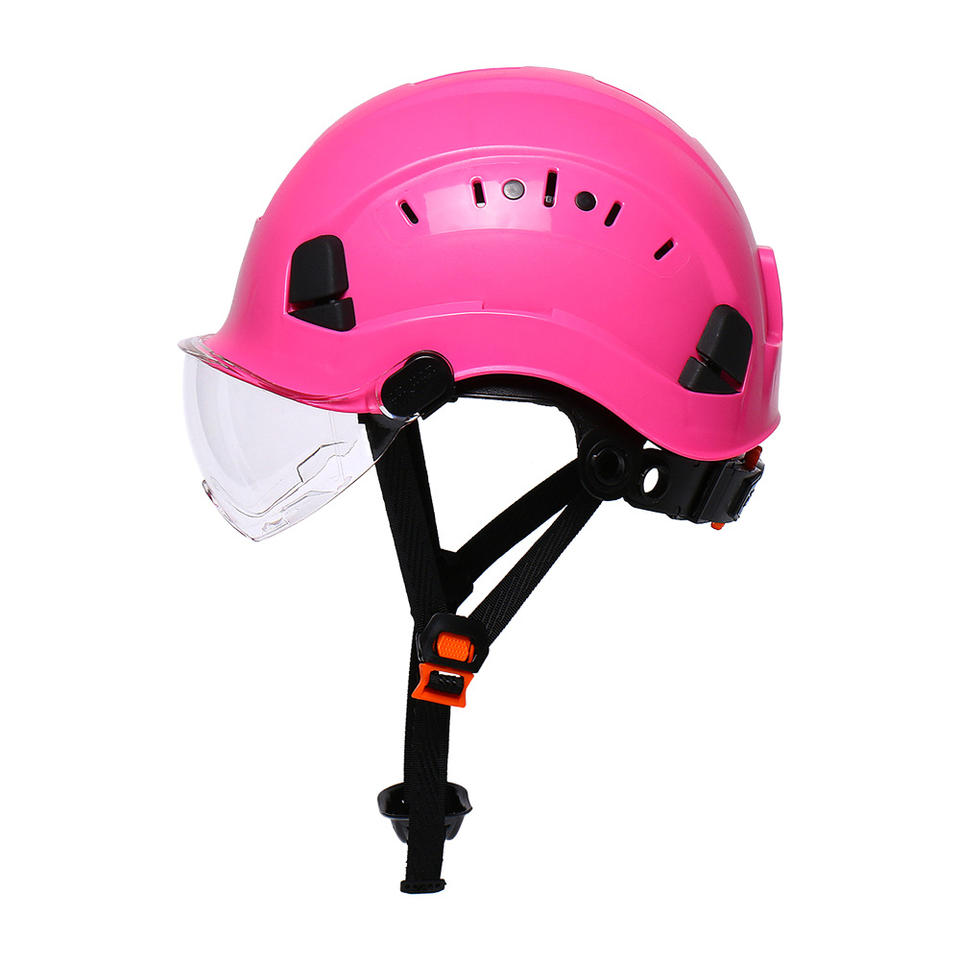 ⇨
⇨
Pure ABS resin, tested for impact/aging; batch sample by FTIR analysis.
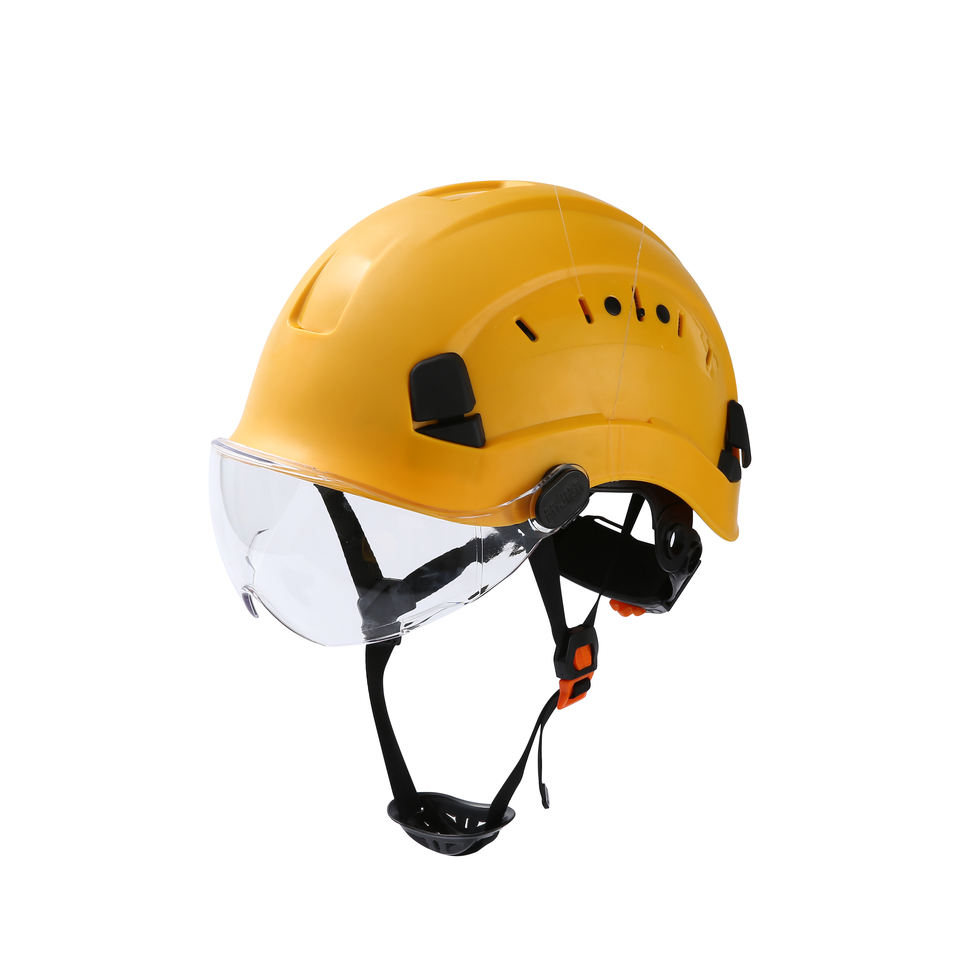 ⇨
⇨
Automated molding, CNC tool calibration, ensures wall uniformity (±0.2mm).
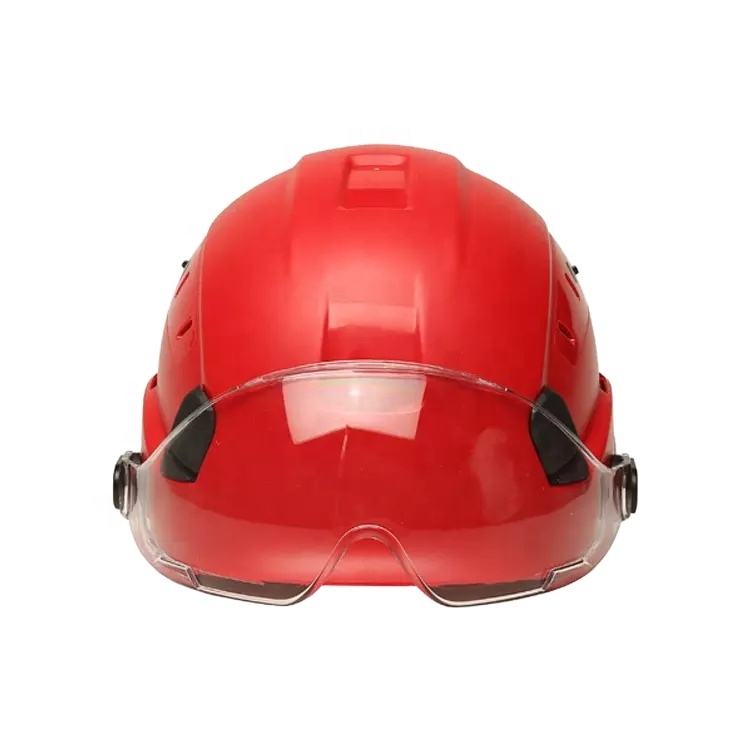 ⇨
⇨
Shatterproof polycarbonate visor, anti-fog/anti-scratch tech, tested for clarity/latch security.
Falls, penetration, dielectric, and UV-aging per EN397, ANSI/ISEA Z89.1.
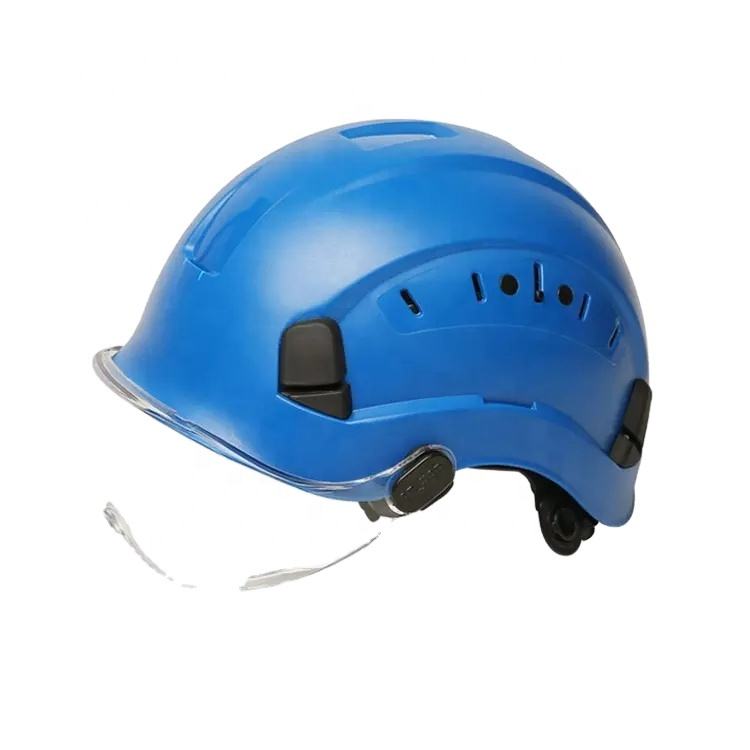
- Material: Premium ABS for main shell, PC/optical-grade visor, hypoallergenic foam band.
- Process: Injection molding & CNC precision trimming, robotic arm assembly lines.
- Certifications: EN397 (Europe), ANSI Z89.1 (USA), GB 2811-2019 (China).
- Service Life: Typical 3–5 years (ABS/PC), prolonged by anti-UV/anti-aging treatments.
- Inspection: Each lot subject to ball impact, drop, flammability, temperature, and electrical insulation tests—certified by SGS, TüV.
| Brand | Main Material | Certifications | MOQ | Customization | Delivery Time | Warranty | Supports Bulk OEM? |
|---|---|---|---|---|---|---|---|
| Goodsafetyhelmet (China) | ABS/PC | ISO/EN397/ANSI | 300 pcs | Logo/Color/Visor Shape | 10–20 days | 3 years | Yes |
| MSA (USA) | ABS/HDPE | ANSI Z89.1 | 100 pcs | Partial | 30–45 days | 2 years | Yes |
| Petzl (France) | Polycarbonate | EN12492 | 40 pcs | Color | 20–30 days | 2 years | Limited |
| Uvex (Germany) | ABS/PC | EN397, EN166 | 200 pcs | Visor/Color | 18–35 days | 3 years | Yes |
- Color Choices: White/Yellow/Orange/Blue/Fluorescent/Custom.
- Logo Printing: Silk-screen or pad print for company branding.
- Visor Design: Retractable, fixed, flip-up; anti-scratch, anti-fog coated options.
- Accessory Add-ons: Ear muffs, headtorch clamps, reflective stickers.
- Packaging: Bulk carton, individual box with customer branding.
MOQ: 300 pcs for OEM
Warranty: 3 years, with replacement for QC issues.
Compliance: Tested per GB/T 2811-2019 (China), ISO 3873 (International), ANSI Z89.1/EN397 (America/EU).
Petrochemical/Power Plants: Helmets rated for electro-insulation (Class E) protect against electrical hazards and chemical splashes.
Metalworking & Foundries: Face visor shields from sparks, hot chips; helmet achieves highest impact ratings, making it preferred for harsh industrial settings.
Municipal/electric utility maintenance: Provides head and facial protection for utility and inspection teams exposed to height work and electrical conductors.
- Industry: Petrochemical
- Helmet Model: ABS Material Engineering Safety Helmets with Worker Visor
- Deployment: 1,800+ helmets for contractors and operating staff
- Feedback: “The adjustable safety helmet with visor provided superior field-of-view and reduced splash/impact incidents by 22% compared to older models.”
- Outcome: Zero facial injury reports during 28-day shutdown.


- Impact Resistance: 90J (ABS) vs. 45J (HDPE)
- Visor VLT: 88% optical clarity, EN166 class 1
- Electrical Insulation: Class E (up to 20kV)
- Service Life: 4–5 years (ABS/PC combination)
ABS (Acrylonitrile Butadiene Styrene) is a high-impact engineering plastic known for toughness, chemical resistance, and lightweight properties. Its shock absorption makes it ideal for safety helmet with visor manufacturing in demanding industries.
Tested in joules (J), impact resistance measures energy absorption during falls/forceful contact. Per ISO 3873/EN397, helmet must withstand 49J for industry use; ABS helmets exceed 80J, providing superior user protection.
Key standards include EN397 (EU), ANSI Z89.1 (USA), ISO 3873 (global), and GB 2811 (China). Visor clarity is additionally certified per EN166. Products are batch-tested for compliance.
ANSI Class E indicates tested insulation up to 20,000 volts AC—essential for helmet protection on electrical work sites.
Typically 3–5 years, or sooner if exposed to chemical or heavy UV conditions. Regular visual and structural checks as per manufacturer guidance ensure optimal performance.
Yes, replacement is possible. VLT = Visible Light Transmission; higher VLT (≥88%) ensures clearer vision while blocking UV/glare (per EN166).
Options include shell/visor color, logo printing, special coatings (anti-fog/anti-static), packaging, and ergonomic adjustments. MOQ for custom OEM orders: 300 pcs.
- Standard Lead Time: 10–20days (regular), 18–25days (custom/OEM)
- Quality Guarantee: 3-year warranty; full replacement in case of verified production defect
- After-sales Support: 24/7 email and phone support; technical documents, installation video, certificate download available
- Authorized Certifications: ISO, EN397, ANSI Z89.1, SGS/TüV tested and validated each batch
- Cooperation Record: Certified supplier for Sinopec, Power China, and Top 5 EPC contractors
The safety helmet with visor—especially advanced ABS engineering variants—stands as the benchmark for construction and industrial worker head protection, offering technical superiority, extensive customization, and end-user-approved reliability for diverse applications. For further technical reading, see:
- IOSH Discussion: Safety Helmet Visors in Industry
- ScienceDirect: “Effectiveness of Industrial Safety Helmets—An Optical and Mechanical Assessment”
- OSHA Technical Resource—Head Protection Standards
-
Women's Safety Clothing Canada | Hi-Vis & Durable Gear
NewsAug.27,2025
-
Durable Safety Helmet Hats: Ultimate Head Protection & Comfort
NewsAug.26,2025
-
HDPE Safety Helmet: Durable Head Protection for Work Sites
NewsAug.25,2025
-
Stylish Baseball Cap Safety Helmet | Discreet Head Protection
NewsAug.24,2025
-
Durable Waterproof Safety Clothing | Custom & High-Vis Protection
NewsAug.23,2025
-
Premium Reflective Safety Clothing | High-Vis Workwear
NewsAug.22,2025
